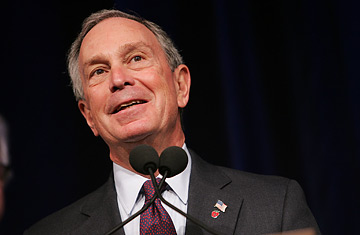
New York Mayor Mike Bloomberg
What a difference a decade makes. Bloomberg is now New York City's Mayor, and Tuesday he quit his second major party, bailing on the Republicans just as he bailed on the Democrats in 2000. It's not a huge shock; in an interview for TIME's current cover story on Bloomberg and California Governor Arnold Schwarzenegger, he was equally dismissive of reds and blues. "I don't see any difference between the parties," he said. "They can't stop pork. They can't stand up to the NRA. They can't work together."
Bloomberg said in his statement last night that his plans for the future haven't changed, and he's been saying for months that he has no plans to run for President. He said his official switch to political independence simply "brings my affiliation into alignment with how I have led and will continue to lead this city." And it's true: Bloomberg has been a studiously non-partisan and unusually effective mayor, working with Democrats as well as Republicans — yes, the city still has a few — on big initiatives dealing with education, housing, health, guns, campaign finance and global warming.
Still, it's worth noting that in 1997 Bloomberg wrote that he had no plans to run for anything. And that he recently launched a red-white-and-blue website that looks suspiciously like a candidate website. And that his former campaign manager, Deputy Mayor Kevin Sheekey, has been spinning $500 million Bloomberg-for-President scenarios for months; in a recent interview, one former Bloomberg aide described Sheekey's current job as "Deputy Mayor for Running for President." And that over the last couple of days Bloomberg has delivered what sounded a lot like stump speeches, deriding Washington as a "swamp of dysfunction" and lamenting that the country is "really in trouble" on a wide range of issues, from Iraq to health care.
Indeed, sources tell TIME Washington bureau chief Jay Carney that while the billionaire Mayor has not yet decided for certain that he will run, his becoming an independent now is part of his plan to make sure that the option is there. In order to collect the signatures to get on the ballot in various states as an independent, Bloomberg has to be officially "unaffiliated".
Most people assumed that for a long time now. Bloomberg has often been described as a RINO, a Republican In Name Only, and that was true until yesterday, too. He supports gay marriage, abortion rights and gun control, but not the death penalty; he raised property taxes 18% to deal with a deficit, the ultimate G.O.P. sin. He did trim spending as well, an activity formerly associated with Republicans, and he's tilted towards conservative approaches on welfare, homelessness, and "social promotion" in education; he's a capitalist at heart, revered in the business community. But his citywide bans on smoking and transfats in bars and restaurants reflect his nanny-state liberalism, and his administration is dominated by Democrats.
Of course, he used to be one himself. He left the Democratic Party in October 2000 because he wanted to run for Mayor and the primary was too crowded. He was never a rabid Republican, but he used his cash to court Republicans who could help him and his city —including $2 million to the G.O.P. in New York, more than $5 million to the G.O.P. convention in New York, and smaller donations to congressional Republicans (most quite conservative) with jurisdiction over issues important to New York.
In other words, Bloomberg was a partisan to the extent that it was useful to him. Now that it is no longer useful to him, he's no longer a partisan. He can qualify for the Presidential ballot as an independent; he can also serve in a Democratic or Republican administration (or on a Democratic or Republican ticket) as an independent. And even if he just serves out his term and returns to the private sector, there's now at least a possibility that the dog catcher candidates will leave him alone.
